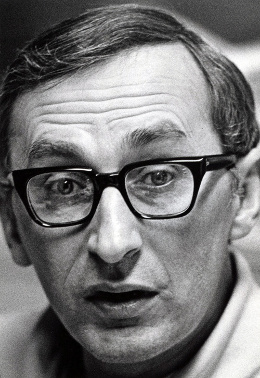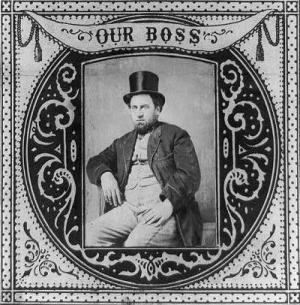
Michael Royko Jr. was an American newspaper columnist from Chicago. Over his 30-year career, he wrote over 7,500 daily columns for the Chicago Daily News, the Chicago Sun-Times, and the Chicago Tribune. A humorist who focused on life in Chicago, he was the winner of the 1972 Pulitzer Prize for commentary.

The Mugwumps were Republican political activists in the United States who were intensely opposed to political corruption. They were never formally organized. Typically, they switched parties from the Republican Party by supporting Democratic candidate Grover Cleveland in the presidential election of 1884. They switched because they rejected the long history of corruption associated with Republican candidate James G. Blaine. In a close election, the Mugwumps claimed they made the difference in New York State and swung the election to Cleveland. The jocular word "mugwump", noted as early as 1832, is from Algonquian mugquomp, "important person, kingpin", implying that Mugwumps were "sanctimonious" or "holier-than-thou" in holding themselves aloof from party politics.

In the politics of representative democracies, a political machine is a party organization that recruits its members by the use of tangible incentives and that is characterized by a high degree of leadership control over member activity. The machine's power is based on the ability of the boss or group to get out the vote for their candidates on election day.

The Progressive Era (1896–1917) was a period in the United States during the early 20th century of widespread social activism and political reform across the country that focused on defeating corruption, monopoly, waste, and inefficiency. The main themes ended during American involvement in World War I (1917–1918) while the waste and inefficiency elements continued into the 1920s. Progressives sought to address the problems caused by rapid industrialization, urbanization, immigration, and political corruption; and by the enormous concentration of industrial ownership in monopolies. They were alarmed by the spread of slums, poverty, and the exploitation of labor. Multiple overlapping progressive movements fought perceived social, political and economic ills by advancing democracy, scientific methods, professionalism and efficiency; regulating businesses, protecting the natural environment, and improving working conditions in factories and living conditions of the urban poor. Spreading the message of reform through mass-circulation newspapers and magazines by "probing the dark corners of American life" were investigative journalists known as "muckrakers". The main advocates of progressivism were often middle-class social reformers.

Daniel David Rostenkowski was a United States Representative from Chicago, serving for 36 years, from 1959 to 1995. He became one of the most powerful legislators in Congress, especially in matters of taxation. He was imprisoned in 1996. A Democrat and son of a Chicago alderman, Rostenkowski was for many years Democratic Committeeman of Chicago's 32nd Ward, retaining this position while also serving in Congress.

Martin Henry Kennelly was an American politician and businessman. He served as the 47th Mayor of Chicago in Chicago, Illinois from April 15, 1947 until April 20, 1955. Kennelly was a member of the Democratic Party. According to biographer Peter O'Malley, he was chosen as mayor by a scandal-burdened Democratic machine that needed a reformer on top of the ticket. Kennelly was a wealthy businessman and civic leader, active in Irish and Catholic circles. As a long-time opponent of machine politics he accepted the nomination on condition the machine would not pressure him for patronage and that he did not have to play a leadership role in the party. This gave him a non-partisan image that satisfied the reform element. As mayor he avoided partisanship and concentrated on building infrastructure and upgrading the city bureaucracy. He worked to extend civil service; he reorganized inefficient departments. The city took ownership of the mass transit system. He obtained federal aid for slum clearance and public housing projects and for new expressways construction. At his death, Mayor Richard J. Daley, the party leader who defeated Kennelly in a bitter primary battle in 1955, called him, "a great Chicagoan who loved his city" and ordered City hall flags placed at half-mast.

In politics, a boss is a person who controls a faction or local branch of a political party. They do not necessarily hold public office themselves; most historical bosses did not, at least during the times of their greatest influence. Numerous officeholders in that unit are subordinate to the single boss in party affairs. Bosses may base their power on the support of numerous voters, usually organized voting blocs, and manage a coalition of these blocs and various other stakeholders. When the party wins, they typically control appointments in their unit, and have a voice at the higher levels. Reformers typically allege that political bosses are corrupt. This corruption is usually tied to patronage: the exchange of jobs, lucrative contracts and other political favors for votes, campaign contributions and sometimes outright bribes.
Progressivism in the United States is a political philosophy and reform movement. Into the 21st century, it advocates policies that are generally considered social democratic and part of the American Left. It has also expressed itself with right-wing politics, such as New Nationalism and progressive conservatism. It reached its height early in the 20th century. Middle/working class and reformist in nature, it arose as a response to the vast changes brought by modernization, such as the growth of large corporations, pollution, and corruption in American politics. Historian Alonzo Hamby describes American progressivism as a "political movement that addresses ideas, impulses, and issues stemming from modernization of American society. Emerging at the end of the nineteenth century, it established much of the tone of American politics throughout the first half of the century."
Politics in Chicago through most of the 20th century was dominated by the Democratic Party. Organized crime and political corruption were persistent concerns in the city. Chicago was the political base for presidential nominees Stephen Douglas (1860), Adlai Stevenson II, and Barack Obama, who was nominated and elected in 2008.
American urban politics refers to politics within cities of the United States of America. City governments, run by mayors or city councils, hold a restricted amount of governing power. State and federal governments have been granted a large portion of city governance as laid out in the U.S. Constitution.

Thomas J. Courtney was an influential Illinois Democratic politician and attorney for roughly 50 years in the mid-20th Century.
In the United States, there are several distinct types of mayors, depending on the system of local government.
"Chicago-style politics" is a phrase which has been used to refer to the city of Chicago, regarding its hard-hitting sometimes corrupt politics. It was used to refer to the Republican machine in the 1920s run by William Hale Thompson, as when Time magazine said, "to Mayor Thompson must go chief credit for creating 20th Century Politics Chicago Style."
This is a bibliography of selected publications on the history of Chicago. For most topics, the easiest place to start is Janice L. Reiff, et al. eds. The Encyclopedia of Chicago (2004), which has thorough coverage by leading scholars in 1120pp of text and many illustrations. It does not include biographies. It is online free. See also Frank Jewel, Annotated bibliography of Chicago history (Chicago Historical Society 1979; not online.

American urban history is the study of cities of the United States. Local historians have always written about their own cities. Starting in the 1920s, and led by Arthur Schlesinger, Sr. at Harvard, professional historians began comparative analysis of what cities have in common, and started using theoretical models and scholarly biographies of specific cities. The United States has also had a long history of hostility to the city, as characterized for example by Thomas Jefferson's agrarianism and the Populist movement of the 1890s. Mary Sies (2003) argues:
At the start of the twenty-first century, North American urban history is flourishing. Compared to twenty-five years ago, the field has become more interdisciplinary and intellectually invigorating. Scholars are publishing increasingly sophisticated efforts to understand how the city as space intersects the urbanization process, as well as studies that recognize the full complexity of experiences for different metropolitan cohorts.

Boss: Richard J. Daley of Chicago is a 1971 non-fiction book by Chicago Daily News columnist Mike Royko, about six-term Chicago mayor Richard J. Daley (1902–1976) and the political machine and municipal government over which Daley presided.

The Chicago mayoral election of 1967 was held on April 4, 1967. The election saw Richard J. Daley being elected to a fourth term as mayor. Daley's main opponent was Republican nominee John L. Waner, who he defeated by a landslide 48% margin.

The Chicago mayoral election of 1959 was held on April 7, 1959. The election saw Richard J. Daley being elected to a second term as mayor by a landslide margin of more-than 40%.

In the 1911 Chicago mayoral election, Democrat Carter Harrison Jr. was elected to his fifth non-consecutive term as mayor, tying the then-record set by his father Carter Harrison Sr. for the most Chicago mayoral election victories. Harrison defeated Republican nominee Charles E. Merriam and Socialist nominee William E. Rodriguez.

The Chicago mayoral election of 1883 was held on Tuesday April 3, saw incumbent Carter Harrison Sr. defeat Republican Eugene Cary by a double-digit margin.










